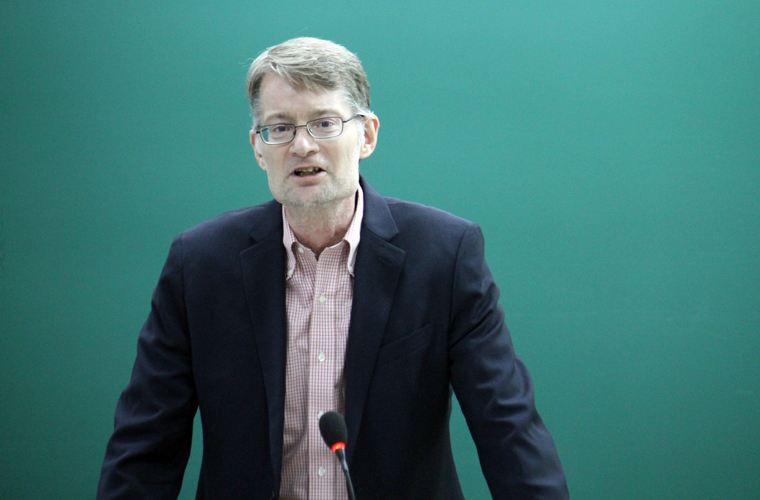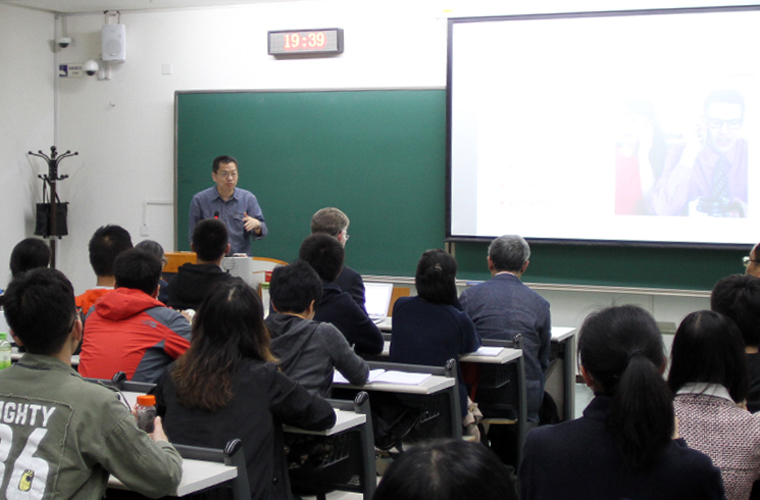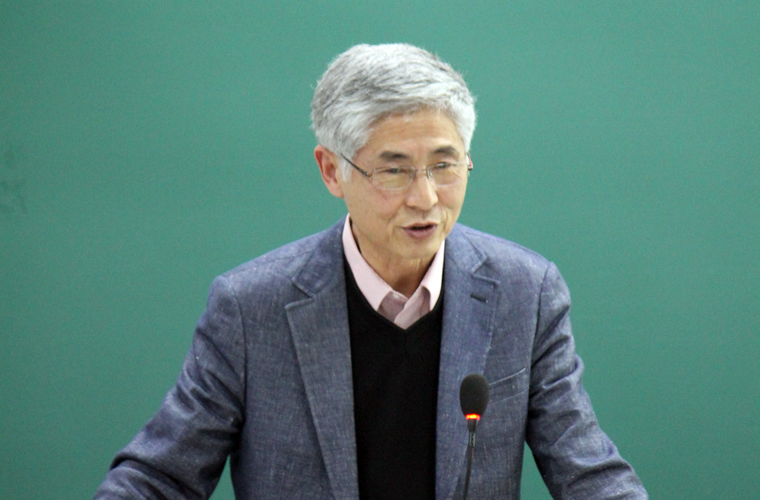



Invited by IAHS, Stephen C. Angle, Philosophy Professor at Wesleyan University and Berggruen Scholar of Department of Philosophy at Tsinghua University, delivered a fascinating lecture on “Progressive Confucianism and Contemporary Society” on April 7, 2017 at Peking University. The Lecture was hosted by Professor Ni Peimin, Executive Vice Director of IAHS, and commented by Professor Gan Chunsong from the Department of Philosophy at PKU.
Professor Angle introduced the background of Progressive Confucianism, that is to say, after being criticized for more than 100 years, Confucianism is supposed to keep pace with the times in facing many challenges from the contemporary society. It should be a living tradition following the changing times instead of being a set of rigid doctrines. It is impossible for us to go back to the past; therefore, progressive Confucianism must admit and accept modernity, although it has to do it critically. According to Prof. Angle, the standard to judge progressiveness within Confucianism is “Inner Sage and Outer Kingliness”, which includes three main aspects: developing moral virtues, arranging social systems, and criticizing oppressions. Professor Angle took the “differentiation between husband and wife” as an example to illustrate his point. He criticized conservative interpreters of Confucianism for arguing that modern women should be confined to traditional responsibilities within the family. He pointed out that their arguments are problematic for three reasons: Firstly, conservatives refer to the “natural differences” between man and woman, but these differences are not natural; they are socially constructed. Secondly, the authority of the Confucian classics that conservatives based on are questionable, and there can be diverse interpretations of these texts. Thirdly, pragmatic arguments against the legitimacy of certain human relationships require evidence and must be balanced against other pragmatic reasons. Most importantly, Confucian evaluation of human relationships should be based on the standard of whether such relationship is consistent with developing moral virtues. Rejecting homosexual marriage results in oppressions on homosexuals, and is not conducive to the development of virtue. Professor Angle emphasized that rituals used for regulating people’s behaviors must not become rigid dogmas. Quoting Donald Munro’s thesis of “natural equality,” Angle pointed out that Confucians must insist that everyone be given equal possibility for becoming a sage. Based on this, progressive Confucianism would re-evaluate traditional human relationships and traditional rituals so that we allow everyone equal chance to develop their virtues. Translating this into the relationship between husband and wife, Angle argued for equality and for a flexible approach to dividing responsibilities based on caring attention to one another. He concluded by saying that progressive Confucianism would also accept same-sex marriage.
Prof. Gan Chunsong was invited to comment on Prof. Angle’s lecture. He first summarized Prof. Angle’s rationales for upholding progressive Confucianism, and then explained why he thinks the view should be questioned. Prof. Gan believed that neither external criticism nor changes of social circumstances imply that Confucianism need to “step forward.” Confucianism, as a pursuit of certain definitive values, must have a value bearing standpoint, which means sticking to certain unchangeable principles. According to the Book of Rites, although the forms of rites can comply with changes of an era, the spirit behind the rites should never change (e.g. the form of sacrifice may change but the spirit of sacrifice should remain constant). According to Prof. Gan, the feminists who believe that differences between men and women are social constructions are denying the basic fact that at least biologically, men and women are different. Prof. Angle put too much emphasis on the changeable formality of “rites” but neglected the unchangeable substance in the “rites”. In Prof. Gan’s opinion, Confucianism don’t have to be “feminist” so as to make great progress, instead, it should not drift with the current and it should stick to the unchangeable and “outdated” values in a complex modern society.
Prof. Angle’s lecture and Prof. Gan’s thought-provoking comments brought about audience’s active questions. During the Q&A part, the audience and the speakers had a heated discussion around questions such as the relationship between the role of women’s traditional virtues and its relation with the logic of progressive Confucianism, how possible it is for women in the traditional society to become sage and how to achieve “Inner Sage and Outer Kingliness” under the new social condition. Prof. Angle and Prof. Gan responded to the questions in great detail. The event came to a conclusion with a loud applause of the audience.

Copyright@2014北京大学高等人文研究院 京ICP备案1253235 地址:北京市海淀区颐和园路五号北京大学李兆基人文学苑4号楼 技术支持:iWing